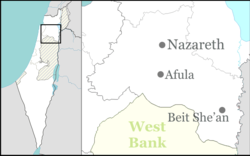Top Qs
Timeline
Chat
Perspective
Migdal HaEmek
City in Israel From Wikipedia, the free encyclopedia
Remove ads
Migdal HaEmek (Hebrew: מִגְדַּל הָעֵמֶק, lit. Tower of the Valley, also officially spelled Migdal HaEmeq, Arabic: مجدال هعيمق) is a city in the Northern District of Israel. In 2023 it had a population of 28,545.[1]
Migdal HaEmek was established in 1953 as a ma'abara for Jews from Arab countries, before becoming a development town. The original site of the ma'abara was west of the current site, at Shimron hill. There is a tower to the north-east, above the town.
Many Israeli and global high tech companies are located in three industrial parks. Among the companies: Tower Semiconductor, RSL Electronics, KLA-Tencor, CI Systems, Nilit, Vishay Intertechnology, Enzymotec and Flex.
Remove ads
History
Summarize
Perspective
Pre-1948
A Roman road ran nearby, with traces found close to the former village of al-Mujaydil. This may indicate that the region was opened to intensive settlement during the Roman period.[2]
Prior to 1953, in the area where Migdal HaEmek was to be established, stood the former Arab Palestinian village of al-Mujaydil. It had existed there since at least 1596 during the Ottoman period.[3][4][5] In July 1948 al-Mujaydil was completely destroyed[6] due to aerial bombing[7] during the operations conducted by the Golani Brigade, when the villagers fled, resulting in its depopulation.[8]
Migdal HaEmek (est. 1953)
Migdal HaEmek was established in 1953 as a ma'abara for Jews from Arab countries, before becoming a development town. The original site of the ma'abara was west of the current site, at Shimron hill.
In 1959, during the Wadi Salib riots, the "Union des Nords-africains led by David Ben Haroush, organised a large-scale procession walking towards the nice suburbs of Haifa creating little damages but a great fear within the population. This small incident was taken as an occasion to express the social malaise of the different Oriental communities in Israel and riots spread quickly to other parts of the country; mostly in towns with a high percentage of the population having North African extraction like in Tiberias, in Beer-Sheva, in Migdal HaEmek."[9]
The chief rabbi of the city is Rabbi Yitzchak Dovid Grossman, who won the Israel Prize in 2004 for his social service work and outreach youth programs. Every year volunteers from Habonim Dror come to Migdal HaEmek to volunteer in the community.[citation needed]
Remove ads
Demographics
According to CBS, in 2001 the ethnic makeup of the city was all Jewish and "other" non-Arabs. There were 11,900 males and 12,200 females. More recently the Jewish Agency estimated Migdal HaEmek's population at 28,000, almost half foreign-born, from Russia, the Caucasus, Ethiopia, Morocco, Iraq and South America. In 2022, 87.5% of the population was Jewish and 12.5% was counted as other.[10]
Education
According to CBS, there were 22 schools and 5,777 students in the city in 2001: 13 elementary schools (2,995 students), and 2 high schools (2,782 students). 47.8% of 12th grade students qualified for a matriculation certificate in 2001.
Economy
Many Israeli and global high-tech companies are located in three industrial parks. Among the companies: Tower Semiconductor (foundry), RSL Electronics (Control and Diagnostic solutions for defence and commercial applications ), KLA-Tencor (inspection tools), CI Systems (electro-optical test systems, non contact temperature sensors and wet chemistry analyzers), Nilit (Nylon for textile industry and thermoplastics for industrial and commercial applications), Vishay Intertechnology (discrete and passive semiconductors components), Enzymotec (functional lipids) and Flex (Electronics contract manufacturer).
Remove ads
Notable people
- Haim Dayan (born 1960), former politician
- Naama Lazimi (born 1986), member of the Knesset
- Rabbi Nachman Bulman, who founded an Orthodox community there
References
External links
Wikiwand - on
Seamless Wikipedia browsing. On steroids.
Remove ads








